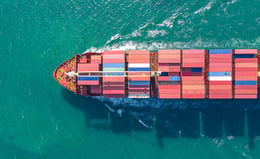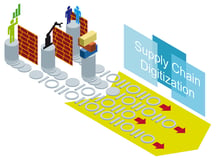The Supply Chain Act and Due Diligence
Martin Pahulje - June 24, 2021

German Supply Chain Act
Supply chains serve as the root of all businesses, and as a result, they are largely involved in politics and legal policies, ranging from environmental to social and economic matters. Companies in the supply chain industry must comply with countless regulations and requirements to ensure their quality and adherence. Therefore, it should come as no surprise when new policies arise, and recently one has been agreed upon in Germany– the Supply Chain Act.
As of May of this year, the CDU/CSU and SPD have reached a compromise on the Supply Chain Act, thus permitting the law to be passed in our current legislative period. "It is now clear that corporate responsibility for human rights does not end at the company's factory gate," said Federal Labor Minister Hubertus Heil (SPD). This is a significant step in the passing of the act as in mid-May, the law had been removed from the Bundestag agenda at the last minute as members of the CDU/CSU saw a need for discussion on corporate liability. A limitation has now been made, praised by the Confederation of German Employers' Associations (BDA). The Bundestag will now meet twice more for regular sessions in June, during which the law can be passed.
The Supply Chain Act states that companies must comply with human rights and environmental requirements in their supply chains, beginning in 2023. Raised with the intention to clear the way for forcing larger companies to fall within specific ethical and environmental boundaries, this act will call for many significant changes. The law aims to curb child labor in supply chains, in addition to the  exploitation and destruction of nature in the global production of goods. "This law will give millions of children and families in developing countries a bit better life chances and future prospects. The EU should now make the German regulation the basis of a proposal for respecting human rights in all European supply chains," said German Development Minister Gerd Müller (CSU), who has been working with Heil on the law for over a year.
exploitation and destruction of nature in the global production of goods. "This law will give millions of children and families in developing countries a bit better life chances and future prospects. The EU should now make the German regulation the basis of a proposal for respecting human rights in all European supply chains," said German Development Minister Gerd Müller (CSU), who has been working with Heil on the law for over a year.
The act also states that companies must verify that human rights violations do not occur throughout their supply chain – both domestically and internationally. Should an organization become aware of an abuse, they are legally obliged to take remedial action. This act will affect companies employing more than 3,000 people, and they are to be covered by the Supply Chain Act from the beginning of 2023. From the start of 2024, the law will then also apply to organizations with more than 1,000 employees.
There is still some discourse surrounding this act, particularly from the AGA Business Association, as they continue to reject the coalition’s proposal. "This law, which the grand coalition has now agreed on, misses the mark. Despite slight adjustments, the Supply Chain Act in this form will be expensive and bureaucratic for many small and medium-sized businesses. We already comply with high, globally recognized standards. Now we get legal uncertainties," explained the AGA.
While the implementation of the Supply Chain Act is still being discussed, the act would make significant improvements to the social and environmental standards of supply chains. While initially, the act will only stand in Germany, there are hopes that it will spread globally, encouraging an increased international standard of business.
Due Diligence Requirements & Digitization
In addition to the German Supply Chain Act, there has been more legislative movement regarding social and environmental standards. In the spring of 2021, the European Commission plans to table a legislative proposal on due diligence requirements to protect human rights and the environment, specifically concerning the supply chain. Both the European Parliament and Council welcome this plan, but the success of a European supply chain law strongly depends on its concrete design. This design requires that the due diligence requirements to be met are proportionate and feasible for companies to implement into their daily practices.
This proposal will make companies responsible for knowing each part of their products and their origin within their supply chain. Companies will be obliged to track each component, ensuring its authenticity. In addition to the due diligence of origin and human rights, environmental and good governance standards will be examined as well. Should this proposal be accepted, supply chains will become significantly more ethical in every way possible. The proposal also states that parent companies based in the EU will be held liable in courts of EU member states for damages caused by business partners or subsidiaries in third countries. This is meant to ensure that supply chain organizations are responsible for the entire scope of their operations, not just locally.
While this may seem like an additional and unnecessary obligation, it actually offers supply chains an opportunity to be more transparent and optimize themselves further. In actively controlling your supply chain through tracking and authentication, supply chains will benefit from greater internal clarity and more trust from customers. In addition, with the use of digitization and intelligent tools, supply chains can become more visible, benefitting both companies and customers.
An instrumental tool in achieving transparency and thus complying with due diligence requirements is NFTs and blockchain in the supply chain. NFTs are tokens with unique metadata that exist on a blockchain. As blockchain enables the verification of tokens, such as NFTs, it offers an immutable authenticity that can guarantee the authenticity of assets without requiring confirmation from a  central figure. Furthermore, NFTs enable the creation of rare and unique assets that cannot be destroyed, replicated, or forgotten. For organizations taking pride in the uniqueness and constitution of their products, this is a critical feature. Additionally, because NFTs can be tracked on the blockchain, there is an immutable history of the assets. Therefore, with the use of NFTs, supply chains can track and verify the origin of their products and assets with ease – to meet compliance and optimize the supply chain as a whole.
central figure. Furthermore, NFTs enable the creation of rare and unique assets that cannot be destroyed, replicated, or forgotten. For organizations taking pride in the uniqueness and constitution of their products, this is a critical feature. Additionally, because NFTs can be tracked on the blockchain, there is an immutable history of the assets. Therefore, with the use of NFTs, supply chains can track and verify the origin of their products and assets with ease – to meet compliance and optimize the supply chain as a whole.
The passing of both the German Supply Chain Act and the European Supply Chain Law could mean significant changes for supply chains. As supply chains are substantial contributors to international damages from a social, human, and environmental perspective, these changes are necessary and should be embraced. While it can be challenging to welcome such changes, it is essential to recognize them as an opportunity for innovation. With the passing of these movements, organizations will have the chance to improve upon themselves, much of which can be done efficiently through digitization. With the help of technologies such as AI and NFTs, supply chains can reach a new and advanced level of transparency, offering optimized operations and an improved reputation. Europe will serve as an example for the rest of the world in encouraging an enhanced way of operating supply chains, and your organization can be at the forefront of this revolution.
Click below to download our guide on Industry 4.0.
LATEST POSTS
- Understand Circular Economy in The Manufacturing Industry
- How Can Industry 4.0 IT Integration Be Achieved Smoothly?
- The Significance of Order Sequencing in Discrete Manufacturing
- How to improve your Supply Chain Management: The Power of Control Towers
- Optimizing Human Resource Scheduling in Manufacturing: A Technological Approach



